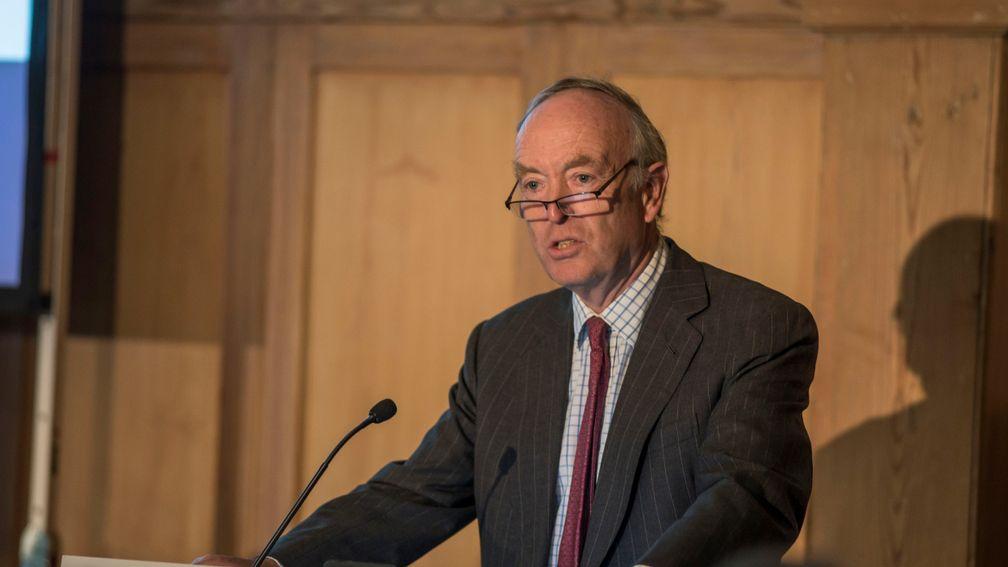Stayers and steroids the talk of TBA annual general meeting
Calls to protect diversity of racing with eye on stamina breeding

Pleas to protect the diversity of British racing, particularly on the Flat, came from all quarters at the Thoroughbred Breeders' Association’s centenary annual general meeting in Newmarket on Wednesday.
TBA chairman Julian Richmond-Watson set the tone for the emphasis on diversity when in a wide-ranging opening address he noted that the association’s raison d’etre – “the promotion and testing of the breed” – had remained the same throughout its 100-year history.
“We came into existence for that reason,” he said, “and it’s why we are all here today. We are custodians of the thoroughbred. Long after we are gone there will be a thoroughbred, and it is up to us to pass on a healthier breed.”
Richmond-Watson outlined the main areas of the TBA’s focus – veterinary, education and training, promotion of the breed and the catch-all category of political – and stressed that the association’s board and executive was working hard in all four to meet current challenges and guarantee long-term sustainability.
In promotion of the breed he illustrated success through a better programme for fillies and mares, both Flat and jumping, the introduction of incentives schemes such as Plus 10 and MOPS, and changes made in the wake of the TBA-commissioned stayers’ report, on the last-named of which he said: “Diversity is incredibly important.”
Recent changes in the fillies’ and stayers’ race programmes were highlighted by Brian Kavanagh, chief executive of Horse Racing Ireland but here providing a keynote speech as chairman of the European Pattern Committee.
They were advanced among four specific initiatives from the EPC that “showed its willingness to adapt,” he said, the others being changes to the European sprint programme and active support for British Champions Day and the Irish Champions weekend.
On the issue of stayers, Kavanagh said: “If we ever wanted an advertisement for the staying programme, just look at this year’s Gold Cup. The stayer has come back into fashion. It brings diversity not just to racing but to the gene pool.
“The EPC has taken a long-term view with the stayers, in assisting breeders and owners. This is not a quick-fix. A series of measures have been introduced aimed at starting the work, but there is more to come and this is a long-term project.”
Turning to Brexit, Kavanagh said much work was going on in the background in Ireland with a view to maintaining, as far as possible, the status quo over the free movement of horses around Europe.
“Our interests are truly aligned with Britain,” he said.
Earlier, Richmond-Watson, who chairs a BHA committee on Brexit, told members that the TBA had put together four working groups to carry out research, with freedom of movement at the heart of the studies.
“The information we have already put together was used at a briefing in Brussels only yesterday,” he said. “We have to be as well prepared as we possibly can, and then hopefully they will come to a sensible outcome.
Racing Post bloodstock editor Chris McGrath gave a guest speech that warned about the possibly dire consequences of over-breeding to horses prematurely retired to stud, either at the end of their two-year-old careers without having achieved Group 1-status ratings or proved their stamina beyond a mile or ten furlongs.
“I’m not blaming modern breeders in general,” he said, “but we do need to think about what is at stake if we are too sheep-like and herd behind these sires.”
Zero tolerance on steroids
Addressing the sometime contentious issue of anabolic steroids, TBA chairman Julian Richmond-Watson told members that the association was “100 per cent committed to zero tolerance,” adding: “No horse will be given steroids before or during its racing career.”
He said: “Welfare is increasingly important. We have to get used to a prerequisite that a foal is registered 30 days after birth.”
Answering a question from the floor about those countries that had not signed an international protocol on steroids, TBA vice-chairman Paul Greeves said: “This is a matter for the BHA, which has published a list of six countries, including Ireland, which are operating equivalent standards to Britain.”
Horse Racing Ireland chief executive Brian Kavanagh refuted a suggestion that the Irish authorities had ditched plans to progress its work on steroids, saying: “There is no issue at all. We are looking for a permanent ban [on horses found to have been treated with steroids] both in Ireland and other countries.”
Greeves added that the issue was “one of process, not principal,” but said that the use of hair for testing, which would reveal long-term use of steroids, was progressing more slowly than envisaged when new rules were mooted three years ago.
Published on inInternational
Last updated
- First foal arrives for Military Style, the half-brother to champion City Of Troy
- Wootton Bassett colt propelled into Golden Slipper favouritism after stunning debut win
- 'We knew he had a big one in him' - Bosustow strikes gold for Blue Point in Magic Millions Guineas
- Group 1 winner and sire Equiano on the move to France
- 'One of Hong Kong racing’s greatest champions' - Designs On Rome dies aged 15
- First foal arrives for Military Style, the half-brother to champion City Of Troy
- Wootton Bassett colt propelled into Golden Slipper favouritism after stunning debut win
- 'We knew he had a big one in him' - Bosustow strikes gold for Blue Point in Magic Millions Guineas
- Group 1 winner and sire Equiano on the move to France
- 'One of Hong Kong racing’s greatest champions' - Designs On Rome dies aged 15